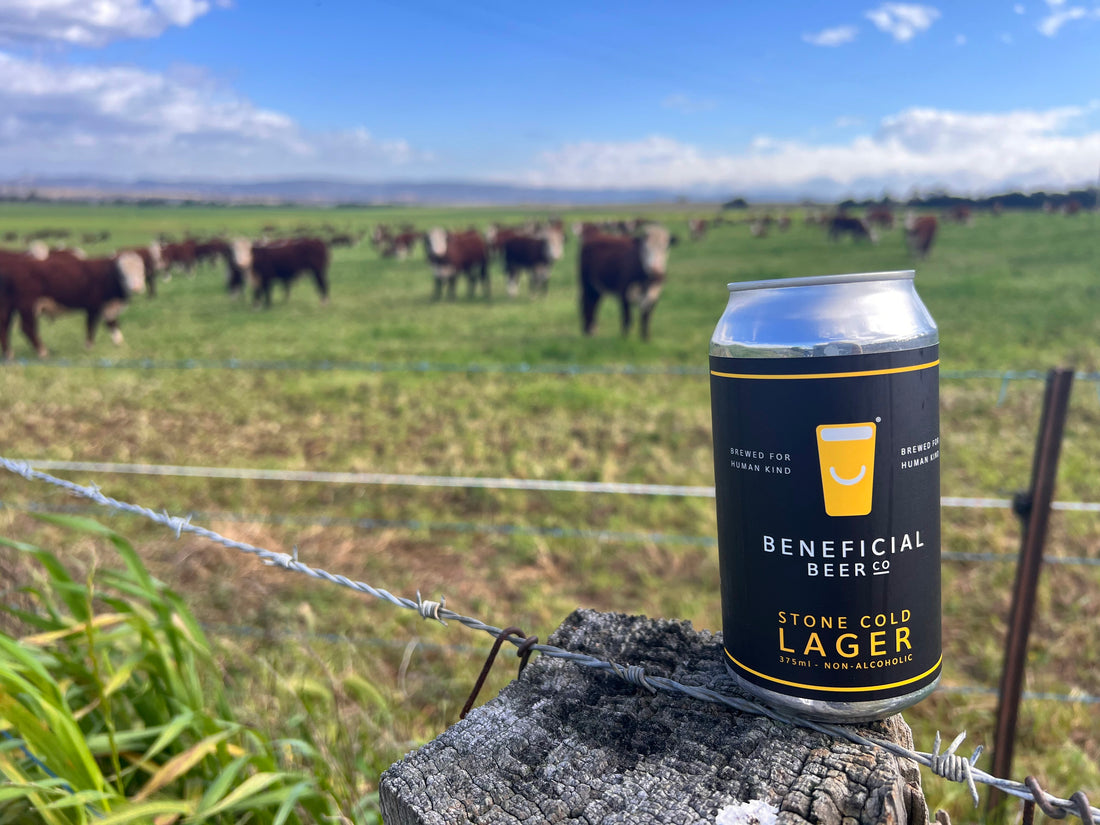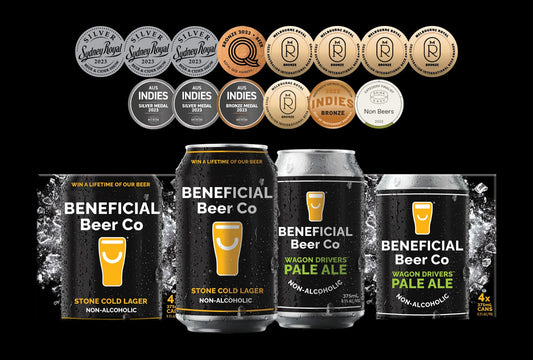While a cold one is innocent enough (especially the guilty-free ones), the father brewing industry pays a hefty carbon footprint to quench our thirst. Even some beloved craft breweries lag on sustainability.
Studies have found that up to 1.9 kg of CO2 is produced for every liter of beer made [1]. What needs to change to brew a greener future?
Luckily, sustainable brewing has played its cards, showing a full house for reducing usage, energy, and waste. But, why now?
The Unsustainable Future of Traditional Brewing
Traditional brewing might take after the ancient ways, but industrialisation has made one thing clear; as environmental degradation grows, our call for sustainable brewing becomes louder.

Brewing a pint isn't just about the ingredients: it involves water usage, energy consumption, and waste.
To produce just 1 liter of beer, traditional brewing processes:
- Require up to 7 litres of water [2]
- Consume an average of 0.6kWh of power [3]
- Wastes 0.2 kg of spent grains and discharges 70% of their incoming water as waste [4][5].
Now, scale this up to global brands, and there’s a problem. In 2022, Australia alone produced 1.7 billion litres of beer [6].
What’s stopping these players from changing?
With the problem so clear, some roadblocks have popped up for traditional brewers. Sadly, they take the shape of financial barriers.
Many breweries don't want to change because of cost and disruption. This could be from integrating new water recycling systems or training new skills.
With the older systems so ingrained, what consequences could we see around the corner?
| Unsustainable Practice | Consequence |
|---|---|
| Excessive water usage | Water scarcity |
| Excessive waste | Pollution |
| Non-renewable methods (from agriculture to production) | Natural resource strain |
Ironically, ignoring sustainability can lead to higher operational costs over time.
Karma works in circular ways...

What is Sustainable Brewing?
More than just a buzzword, sustainable brewing is future-thinking, prioritising the environment, economic longevity, and social responsibility.
Essentially, sustainable brewing focuses on creating high-quality beer using methods that are less harmful to the planet.
But with all new technology, adoption can be tricky to set up, let alone sustain.

Key Areas of Sustainable Brewing
Water Conservation:
Sustainable breweries employ techniques like water recycling and efficient usage to minimise waste. Some sustainable breweries can massively cut their water usage from per litre of beer produced.
Energy Efficiency:
Waste Reduction:
Breweries generate significant waste, but about 85% of this can be repurposed [9]. Innovations like algae-based carbon capture systems are also being explored [10]. This algae converts CO2 emissions into biomass for animal feed or fertilisers.
Sustainable Sourcing:
Ethical supply chains can also help, such as using organic ingredients and supporting local farmers. Urban breweries like Camden Town Brewery in London partnered with vertical farming systems to grow their ingredients sustainably [11].
Sustainable brewing is leading the way to set a new norm - A norm of reduced carbon footprints, natural resource conservation, and less strain on communities.

Beneficial Beer’s Sustainable Brews
Despite the challenges of escaping the traditional brewing cage, Beneficial Beer takes a sustainable-first approach to brewing.
By addressing how we handle water, where we source our energy, and what we do with our ingredients, Beneficial Beer aims to set a new standard for sustainable brewing.
Click the button below to find out how each can of Beneficial Beer helps the planet.
.
.
.
.
References
-
Morgan, D.R., Styles, D. and Lane, E.T. (2021). Thirsty work: Assessing the environmental footprint of craft beer. Sustainable Production and Consumption, 27, pp.242–253. doi:https://doi.org/10.1016/j.spc.2020.11.005.
-
Gould, R., Secondary, M., Moore, B., Grunde, J., Li, S. and Merl, R. (2014). Craft Breweries and Sustainability: Challenges, Solutions, and Positive Impacts. [online] Available at: https://www.diva-portal.org/smash/get/diva2:829201/FULLTEXT01.pdf.
-
Picard, K. (2021). Sustainability part 1: Can’t beer the thought of climate change? [online] Beerable Science. Available at: https://www.beerablescience.com/post/sustainability-part-1#:~:text=Brewing%20is%20a%20very%20water.
-
Chetrariu, A. and Dabija, A. (2023). Spent Grain: A Functional Ingredient for Food Applications. Foods, [online] 12(7), p.1533. doi:https://doi.org/10.3390/foods12071533.
-
APEX PUBLISHERS (n.d.). Brewery Wastewater. [online] www.beer-brewing.com. Available at: https://www.beer-brewing.com/beer_brewing/beer_brewing_brewery_wastewater_management/brewery_wastewater.htm [Accessed 4 Jun. 2024].
-
Statista (n.d.). Australia: beer production volume 2022. [online] Statista. Available at: https://www.statista.com/statistics/999983/australia-total-volume-beer-production/.
-
https://beneficialbeer.com.au/pages/sustainability
-
Rogers, J. (2018). From Iceland — Geothermal Beer: Hveragerði’s Ölverk Brew Pub Is A Must-Visit. [online] The Reykjavik Grapevine. Available at: https://grapevine.is/travel/2018/12/05/geothermal-beer-hveragerdis-olverk-brew-pub-is-a-must-visit/#:~:text= [Accessed 4 Jun. 2024].
-
Morgan, D.R., Styles, D. and Lane, E.T. (2021b). Thirsty work: Assessing the environmental footprint of craft beer. Sustainable Production and Consumption, 27, pp.242–253. doi:https://doi.org/10.1016/j.spc.2020.11.005.
-
Brews News. (2023). Young Henrys combines algae and CO2 capture technology. [online] Available at: https://brewsnews.com.au/young-henrys-combines-algae-and-co2-capture-technology/#:~:text=Young%20Henrys%20brewery%20captures%20thousands [Accessed 4 Jun. 2024].
-
Wills, E. (2019). London Brewery Plants Vertical Strawberry Farm — AGRITECTURE. [online] www.agritecture.com. Available at: https://www.agritecture.com/blog/2019/6/14/london-brewery-plants-vertical-strawberry-farm [Accessed 4 Jun. 2024].




